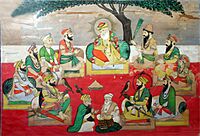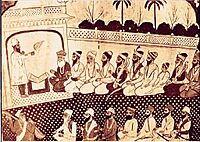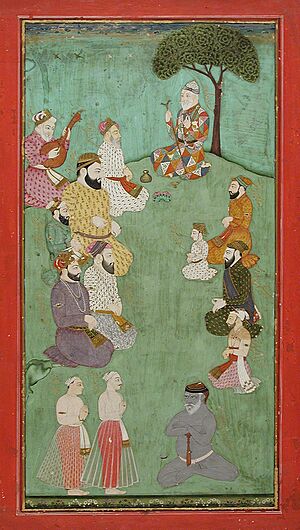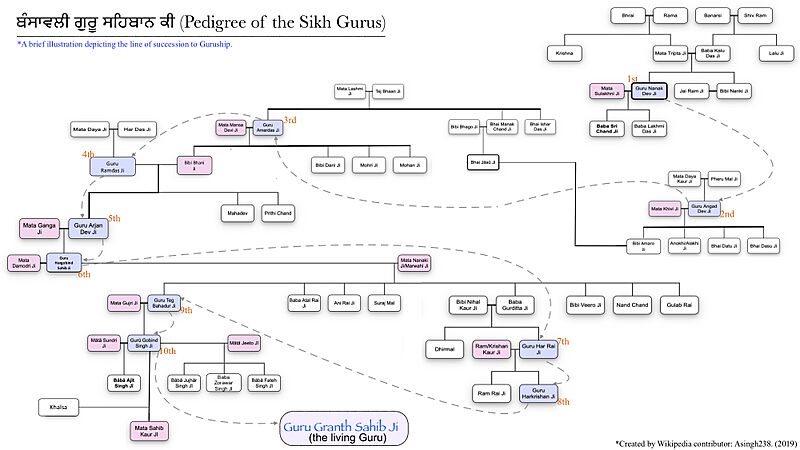Sikh gurus facts for kids
The Sikh gurus are the main spiritual teachers of Sikhism. They started and developed the religion over about 250 years, beginning in 1469. This year marks the birth of Guru Nanak, who founded Sikhism. After him, nine other human gurus led the faith. In 1708, the tenth guru passed on his role to the holy Sikh book, Guru Granth Sahib. Today, followers of Sikhism consider this book their living Guru.
Contents
What Does 'Guru' Mean?
The word Guru comes from Sanskrit, an ancient Indian language. It means a "teacher, guide, expert, or master" in a certain area of knowledge. Bhai Vir Singh, a famous Sikh scholar, explained that "Guru" is made of two parts: "Gu" (meaning darkness) and "Rū" (meaning light). So, a Guru is someone who brings light into darkness or helps people understand things.
This idea helps us understand why the Guru Granth Sahib is seen as a living Guru. It guides Sikhs by sharing the teachings of the Gurus. The word Sikh comes from the Sanskrit word shishya, which means a student or disciple. This shows that Sikhs have a special student-teacher relationship with their Gurus. Their teachings, found in the Guru Granth Sahib, act as a guide for all Sikhs.
Sikhs believe that all the Gurus shared the same spiritual light or soul. Their bodies were just different ways for this same spirit to appear. When one Guru passed away, the next Guru inherited this spiritual light. This is why the Gurus are also called mahalla, meaning "house" or "dwelling" for the same spirit.
Meet the Sikh Gurus
| No. | Name | Portrait | Birth Date | Became Guru | Birthplace | Family Name | Father | Mother | Date of Death | How They Died | Place of Death |
|---|---|---|---|---|---|---|---|---|---|---|---|
| 1 | Guru Nanak | 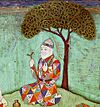 |
14 April 1469 | Since birth | Nankana Sahib, Punjab, Delhi Sultanate | Bedi Khatri | Kalyan Das Bedi | Mata Tripta | 22 September 1539 | Natural causes | Kartarpur, Punjab, Mughal Empire |
| 2 | Guru Angad |  |
31 March 1504 | 7 September 1539 | Muktsar, Punjab, Mughal Empire | Trehan Khatri | Baba Pheru Mal | Mata Ramo | 29 March 1552 | Natural causes | Khadur Sahib, Punjab, Mughal Empire |
| 3 | Guru Amar Das | 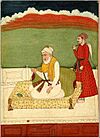 |
5 May 1479 | 26 April 1552 | Amritsar, Punjab, Mughal Empire | Bhalla Khatri | Tej Bhan Bhalla | Mata Lachmi | 1 September 1574 | Natural causes | Goindval, Lahore Subah, Mughal Empire |
| 4 | Guru Ram Das | 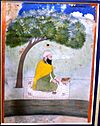 |
24 September 1534 | 1 September 1574 | Lahore, Punjab, Mughal Empire | Sodhi Khatri | Baba Har Das | Mata Daya | 1 September 1581 | Natural causes | Goindval, Lahore Subah, Mughal Empire |
| 5 | Guru Arjan | 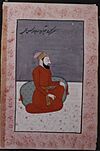 |
15 April 1563 | 1 September 1581 | Goindval, Punjab, Mughal Empire | Sodhi Khatri | Guru Ram Das | Mata Bhani | 30 May 1606 | Killed by order of the Mughal Emperor Jahangir | Lahore, Lahore Subah, Mughal Empire |
| 6 | Guru Hargobind | 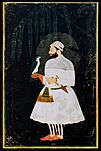 |
19 June 1595 | 25 May 1606 | Amritsar, Lahore Subah, Mughal Empire | Sodhi Khatri | Guru Arjan | Mata Ganga | 28 February 1644 | Natural causes | Kiratpur Sahib, Lahore Subah, Mughal Empire |
| 7 | Guru Har Rai | 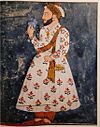 |
16 January 1630 | 3 March 1644 | Kiratpur Sahib, Lahore Subah, Mughal Empire | Sodhi Khatri | Baba Gurditta | Mata Nihal Kaur | 6 October 1661 | Natural causes | Delhi, Delhi Subah, Mughal Empire |
| 8 | Guru Har Krishan | 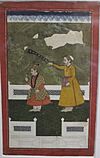 |
7 July 1656 | 7 October 1661 | Kiratpur Sahib, Lahore Subah, Mughal Empire | Sodhi Khatri | Guru Har Rai | Mata Krishan Kaur | 30 March 1664 | Died from Smallpox | Delhi, Delhi Subah, Mughal Empire |
| 9 | Guru Tegh Bahadur | 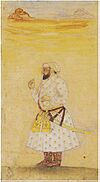 |
1 April 1621 | 20 March 1664 | Amritsar, Lahore Subah, Mughal Empire | Sodhi Khatri | Guru Hargobind | Mata Nanaki | 11 November 1675 | Killed by order of the Mughal Emperor Aurangzeb | Delhi, Delhi Subah, Mughal Empire |
| 10 | Guru Gobind Singh | 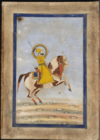 |
14 February 1666 | 11 November 1675 | Patna Sahib, Bihar Subah, Mughal Empire | Sodhi Khatri | Guru Tegh Bahadur | Mata Gujri | 7 October 1708 | Killed by enemies | Hazur Sahib, Bidar Subah, Mughal Empire |
| 11 | Guru Granth Sahib | 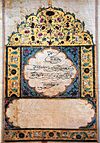 |
29 August 1604 (when the first version was finished) |
20 October 1708 | Amritsar, Lahore Subah, Mughal Empire (where it was put together) |
This is the main holy book of Sikhism. It is seen as the final, most important, and everlasting Guru. | |||||
Timeline of the Gurus
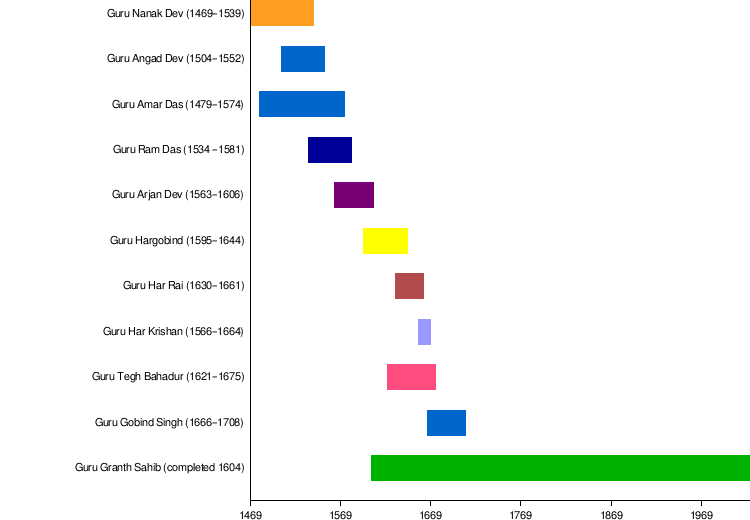
Family Trees of the Gurus
See also
 In Spanish: Anexo:Gurúes sijes para niños
In Spanish: Anexo:Gurúes sijes para niños
- History of Sikhism
- Khalsa
- Gurgadi
- Gurpurab
- Joti Jot


